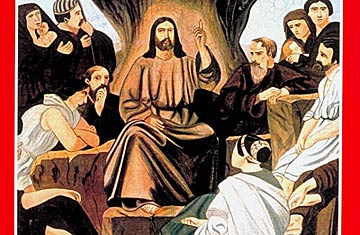
"I went to a Bible study group with my wife. It was just a Bible study, but it angered me. I thought, 'These people talk like they have God in their hip pocket.' But I went eight Wednesdays in a row. The last Wednesday evening, while everyone was praying, I got down on my knees and gave my life to the Lord and I have never been the same since. It was an emotional experience, but it hasn 't passed. That was nine years ago."
Once such words would have been identified, and uncharitably patronized, as the essence of Southern redneck religion. But they were uttered last week at a thoroughly Episcopal church in Darien, Conn.,.an almost stereotypically proper and affluent Northeastern suburb. The speaker, Lee Buck, 54, is a senior vice president of the New York Life Insurance Co. "Before, I wanted to be successful in the world," says Buck. "Now I want to exalt the Lord. I want to stay a businessman, but I want people to know that God changes lives. You don't drop out of the world because you become a Christian." Buck now spends his free time preaching to far-flung church and business groups.
Nationally, the Episcopal Church has lost a member every 15 minutes over the past decade. At Darien's St. Paul's Episcopal, though, Sunday attendance has climbed from 200 to 1,200 in less than five years. Observes the Rev. Everett ("Terry") Fullam, 47, a Harvard Ph.D. who is mainly responsible for infusing the local commuter set with Pentecostal fervor: "The church has functioned subnormally for so long that when it becomes normal, it seems abnormal."
Not only in Darien but all across the country, and indeed the world, that old-time religion is being recycled with ever increasing zeal. Countless people like Lee Buck were brought up to think that revivalism is the province of faith healers, holy rollers and counterfeit preachers—a thing of bad taste, or bad theology, or both —and just possibly a sign of simple-mindedness or galloping hypocrisy as well. Yet there they are today, down on their knees at prayer meetings. They are pursuing the word day by day instead of settling for the sudden thrill of religion only on Sunday—or only at Christmas and Easter.
The Bible Belt is in fact bursting the bonds of geography and seems on the verge of becoming a national state of mind. Encouraged by the presence of a born-again Southern Baptist in the White House, stirred by the widespread fear that modern man will not be able to make it to the end of the century without some spiritual help, the far-flung residents of the new Bible Belt are loosely lumped together under the name Evangelicals. There are an estimated 45.5 million of them on the U.S. church rolls* after a generation of steady growth. They are outnumbered only by the Roman Catholics (49 million). Says Rice University Sociologist William Martin: "The Evangelicals have become the most active and vital aspect of American religion today." He is almost certainly right.
It is easier to see signs of Evangelical life than to define exactly what an Evangelical is. The movement cuts across many denominational lines and includes a number of distinct subgroups. Among them: Fundamentalists, the militant right-wing churchmen who oppose all accommodation to
